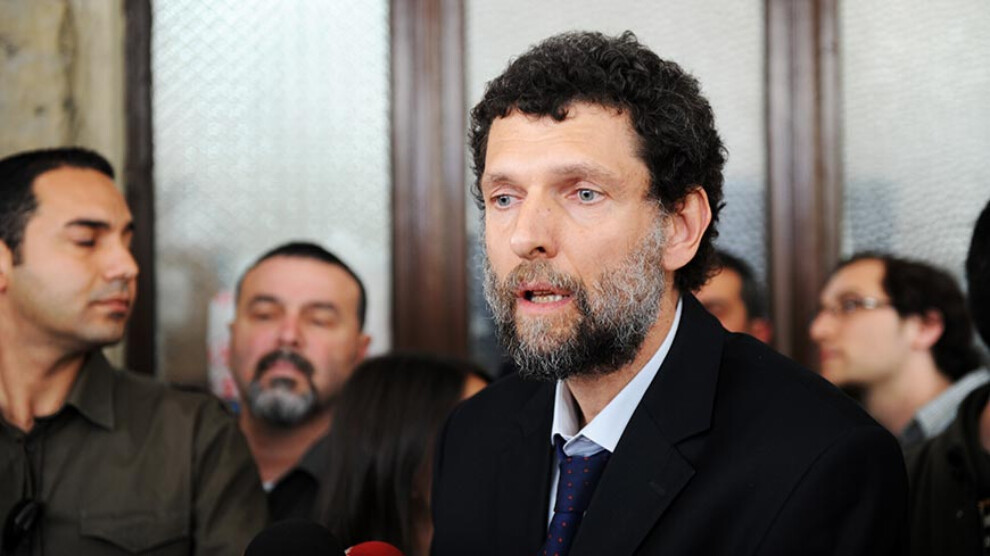ECHR: Turkey failed to comply with ruling to release Kavala
The Court found that Kavala’s pre-trial detention took place in the absence of evidence and pursued an ulterior purpose, namely, to silence him and dissuade other human rights defenders.
The Court found that Kavala’s pre-trial detention took place in the absence of evidence and pursued an ulterior purpose, namely, to silence him and dissuade other human rights defenders.

The European Court of Human Rights Grand Chamber heard the case of philanthropist Osman Kavala in Strasbourg on 11 July. The Grand Chamber convened to determine whether Turkey abided by the ECtHR verdict on Kavala as per article 46/1 of the European Convention on Human Rights on "binding force and execution of judgments."
The case was taken to the chamber after the Council of Europe Committee of Ministers initiated infringement proceedings against Turkey due to its failure to abide by the decision for the release of Kavala on December 10, 2019.
Kavala has been in jail for over four years, accused of anti-state activities in connection with the anti-government Gezi protests of 2013 and the so-called attempted coup in 2016.
The 64-year-old denies the allegations against himself, describes them as "conspiracy theories" and sees himself as a victim of political instrumentalization by the Turkish government. The European Court of Human Rights assessed the first trial against Kavala in December 2019 as politically motivated and demanded his release. Turkey ignored this.
On April 25, he was sentenced to aggravated life imprisonment for "attempting to overthrow the government" and the seven other defendants were sentenced to 18 years in prison for aiding the attempt.
Europe's top rights court said on Monday that Turkey had not complied with a ruling that called for the release of Osman Kavala.
Remarking that Kavala has remained in detention on the basis of proceedings criticised by the European Court or based on evidence which it found insufficient to justify his detention since 11 May 2020, when the Court’s judgment became final, the Court stated that, “by not having ensured the applicant’s immediate release, Turkey refuses to abide by the final judgment of the Court.”
The Court found that Kavala’s arrest and pre-trial detention took place in the absence of evidence to support a reasonable suspicion he had committed an offence and pursued an ulterior purpose, namely to silence him and dissuade other human rights defenders, and that the one year and nearly five months taken by the Constitutional Court to review his complaint was insufficiently “speedy”, given that his personal liberty was at stake.
“The government must take every measure to put an end to the applicant’s detention and to secure his immediate release,” said the Court, which also sentenced Turkey to pay Kavala the sum of EUR 7,500.
The Committee of Ministers of the CoE, which oversees the implementation of the European Court of Human Rights (ECHR) rulings, referred the case back to the court in February.
Kavala, who has been in jail for nearly five years, has since been convicted of attempting to overthrow the government and was sentenced to life in prison without parole in April.
Seven others were sentenced to 18 years for aiding him in what critics said was a political trial aimed at criminalising nationwide demonstrations in 2013, known as the Gezi protests, the biggest popular challenge to then-premier Tayyip Erdogan.
Ireland’s Minister for Foreign Affairs and Chair of the Council of Europe’s Committee of Ministers, Simon Coveney, the President of the Parliamentary Assembly of the Council of Europe, Tiny Kox, and the Secretary General of the Council of Europe, Marija Pejčinović Burić, have made the following statement on the European Court’s judgment in Kavala v. Türkiye case:
“The European Court of Human Rights, in its judgment released today, has confirmed the Committee of Ministers’ view that by not having ensured Osman Kavala’s release after the Court’s first judgment in his case, Türkiye has failed to fulfil its obligations under the European Convention on Human Rights. We welcome today’s judgment which provides a definitive answer on this point. We renew our call for the immediate release of Mr Kavala.
“We urge Türkiye, as a Party to the Convention, to take all necessary steps to implement the judgment. This matter will remain under the supervision of the Committee of Ministers until the judgment is fully implemented.”